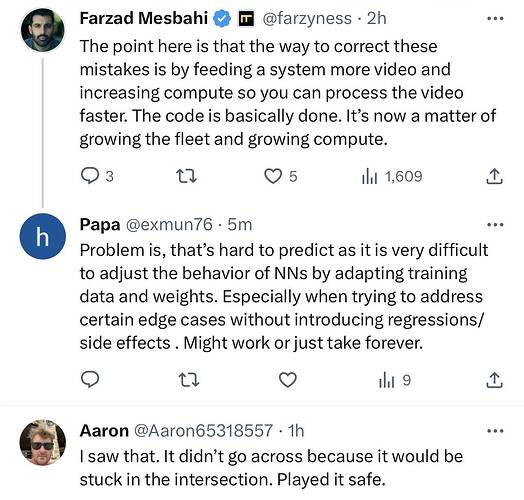Apparently an AI bot put this together.
https://twitter.com/farzyness/status/1695466366914961749
Bye bye SWEs. Get a new career. May be not…
Code is basically done? Just increase on-car compute and problem solved?
Man, these fanbois are dumb.
I look at it this way. Driving is actually a pretty simple task. Teenagers learn to do it with pretty minimal training. AI can’t do it despite years and billions spent on it. AI is going to magically replace people in jobs which require significant education and/or training? Call me skeptical.
All it’s proven it can do is process massive amounts of text and provide short summaries of it. At best, AI can be used to automate the most mundane and repetitive tasks to make employees more productive. A lot of that can be automated with technology far less powerful than AI.
The issue is management has zero incentive to do it when budgets and headcount are growing. Managing a bigger team means a bigger title and more money. It’s not until budgets and headcount are cut that people care about automation and efficiency.
AI’s strengths and weaknesses are orthogonal to human intelligence.
It can be brilliant in things we think are difficult. Reading a 20-page long report and gives a short summary is a post college-level skill. Or generate a piece of art in less than a minute given just a text prompt.
But AI is also dumb at things we humans think are trivial. Like learning to drive a car. Teenagers don’t need to process billions of hours of simulation to learn it. We pick it up in just a few hours. Can Boston Dynamics’ robots ride a bike? I doubt it. That’s after 20 years of development.
What age do kids start doing book reports? That’s all it is. It’s a time saver, but it’s not difficult.
Companies won’t even spend money on decent customer service systems. Calls get transferred from one person to another, and the conversation literally starts from zero each time. It’s not rocket science to have the caller and notes from the call transfer with the call. They won’t even spend on that, so I’m skeptical they’ll spend a meaningful amount on AI. They’d rather spend money on marketing to acquire new customers than improve customer experience to reduce churn.
.
Is this an opinion or you read it somewhere?
This is not a good example. For teenagers, learning driving is incremental. For AI, start from ground zero.
AI quickly harvests and amalgamates information generated by humans - who are biased and make lots of mistakes.
Why does it matter? Thought it’s obvious.
What does it mean? Or better question: why can’t AI learn how to drive in the same amount of time teenagers do?
Here’s another opinion of mine I don’t see mentioned often. The tasks that are hard for AI all seem to be essential for humans to survive millions of years of harsh environments. If you don’t want to be eaten by a tiger you better be able to run. Or if you want to be able to hunt animals you need good hand eye coordination.
So these motor skills that humans find easy to learn and do have undergone millions of years of evolutionary pressure. We are good at these because we have to. Or else.
More abstract skills like summarizing reports or making art don’t have that kind of evolutionary benefit to our survival.
Hard vs easy is therefore a misguided concept in talking about human vs artificial intelligence.
My opinion remains, many people don’t know how to make proper comparison.
I think this would make some people think twice about the quality of data inputs to all of these AI models. There’s an old saying of garbage in, garbage out. AI just distributes the garbage with much greater efficiency and scale. Meanwhile, some people seem to blindly trust the accuracy.
.
Many ways to look at this. For example, AI is good at anything that can be processed and represented digitally ![]() in entirety.
in entirety.
Edit: Added in entirety.
All information can be represented digitally.
You can turn the self-driving problem into a digital video game, ie you can collect all the sensor input, present it to the AI that’s just hosted on a cloud server somewhere instead of in a car, and see how it reacts. In this way, all the input and output are digital.
Being “digital” doesn’t change the nature of the problem, provided the sensors capture enough “analog” information. With Cruise and Waymo we know their sensors are capturing enough. All problems can be turned into digital problems.
.
Guess my England is not good. Translating to physical movements IMHO is not representing digitally. It is impossible to represent that entire real-life scenes digitally. Driving is not just a software app… it involves many physical parts.
You don’t realize the things you see and the things you feel are just electrical signals to your brain?
You are not feeling reality. You are feeling a representation of reality in your brain.
.
You are sure are digital signals and not analogue signals?
Changed my wording to say electrical signals.
Fundamentally there is no reality in the sense that we are all experiencing a representation of it. You think you see something real but you aren’t. Our brain just convinces us we saw something.
We can ask whether a representation has enough details for computers to solve a problem. Saying a problem is digital or analog is not that meaningful to me. If we understand a problem deeply enough then we know which part of it is essential and which part is not. So saying something is “analog” because computers can’t solve them yet just means we don’t understand the problem well enough yet.
But we will eventually understand these problems. And they will become “digital” in due time. There is no fundamental difference.
Facial recognition took forever. It’s intuitive to most humans.
OT but one in 50 humans are faceblind. Facial recognition wetware never got installed in the womb. Hard to tell who they are; they use workarounds so as not to look stupid or weird. Memorizing unique features like pimples somewhere. Using context - lots of folk only show up in your life under specific circumstances. Using innocent sounding queries to nail down who they are talking to. Being social with strangers in case it’s someone they know. And if it’s someone they don’t know and they come off as awkwardly forward – no harm. They’ll likely never run into that person again. The worst off can’t recognize their own spouses if they change their hair. It’s incurable. Faceblind people can be taught to defeat the test for face blindness but it doesn’t get fixed.
Face recognition didn’t take “forever”. Considering semiconductors were only invented like 80 years ago and PC barely 50 years old, it’s a minor miracle face recognition is now available on any iPhone.
Same with voice. It used to be sci fi to have a computer understand human speech. Now it’s available on a $20 Amazon echo.
These are classical “analog” problems. Being analog didn’t prevent them from being solvable.
.
So you are now sure all signals to the brains and inside the brain are electrical signals, there are no other non-electrical such as chemical? What about the associated magnetic field? No impact?
.
What is the driving problem? My feelings is people underestimate the problem. They focus on the incremental portion and omit a lot. A teenager has tons of relevant knowledge and need to learn the incremental only during driving lessons.
Relevant knowledge eg a square, a circle, a human, a tree, walking, running, roads, weather, child, sick child, fat child, happy child, etc.


